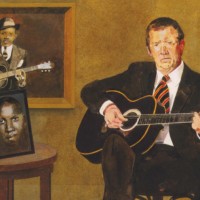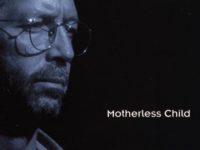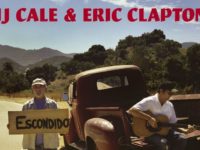Eric Clapton has certainly done a lot to make us forget his roots in the blues tradition, starting with his turn toward psychedelia in Cream — just a couple of years after a celebrated stint with John Mayall’s Bluesbreakers — and continuing with his reggae experiments in the 1970s, then the sleek pop sides in the 1980s.
In between, he was more apt to indulge in low-key singer-songwriter musings, very much in the style of his some-time collaborator J.J. Cale, than to unleash a sizzling blues lick. But that doesn’t mean there weren’t moments to savor along the way back then.
More recently, Clapton has made a series of returns to his early penchant for rootsier sounds — digging into the legacy of Muddy Waters, Freddie King, Bo Diddley, Big Bill Broonzy and others on 1992’s Unplugged and 1994’s From the Cradle, pairing up with B.B. King in 2000, and doing an album of Robert Johnson songs in 2004.
But where to start? We dug around through Clapton’s solo career to find our five favorite blues tracks, then tossed in a bushel of honorable mentions to help complete your playlist …
“DOUBLE TROUBLE,” JUST ONE NIGHT (1980): Recorded live at the Budokan in Tokyo in December 1979, this song’s sentiment — like the best blues — transcends its own moment.
“Lay awake at night, can’t sleep — just so troubled,” Clapton sings, echoing the unemployment narrative of untold millions of American these days. “Hey, they say you can make it, if you try. Yes, in this generation of millionaires, it’s hard for me to keep decent clothes to wear.”
Clapton then launches into a brilliant five-minute song-closing solo, going from fiery declamations to the quietest murmuring cries of desolate worry. Behind him is an understated band that includes second guitarist Albert Lee, keyboardist Chris Stainton, bassist Dave Markee (he really grooves late in the proceedings) and drummer Henry Spinetti — who seem to build the song up to explosive conclusions at the 5:30 and 7-minute marks, before falling back into the same loping groove again.
Clapton keeps going, and this song keeps getting better.
[SOMETHING ELSE! INTERVIEW: Eric Clapton biographer Chris Welch, a longtime friend, surveys the guitarist’s life and career in the 2012 book ‘Clapton: The Ultimate Illustrated History.’]
“MOTHERLESS CHILD,” FROM THE CRADLE (1994): There were certainly times where Clapton’s fealty to the originals, not to mention his inability to match the sexually charged vocal intensity of forebears like Howlin’ Wolf and Muddy Waters, turned From the Cradle — his long-awaited throwback studio album — into a rote exercise.
But “Motherless Child” isn’t one of them. Presented not as a jangling country blues, this traditional composition by Robert Hicks moves with a stomping sense of determination through every phase of a bad relationship. There’s the apologies for the way his damaged life makes him a bad mate, the dark accusations after an unexplained night out, then the final eruption of anger: “I did more for you than your daddy ever done!”
The brittle rhythm, like his dusty boot was stomping on the floorboard of a front porch, fits in snug amongst the acoustic groove, even as Clapton — finally, blessedly, in a moment that fans have been hoping for since he left Mayall in 1966 — lets the blues overtake him.
[SOMETHING ELSE! REWIND: Remembering Eric Clapton’s legendary 1960s tour through Europe with harmonica ace Sonny Boy Williamson II, the only time the blues icon was recorded live.]
“THE SKY IS CRYING,” THERE’S ONE IN EVERY CROWD (1975): Clapton’s voice cracks with a dry emotion, like he’s looking out the window at the rain after a very, very bad night. And, by all accounts, the sessions were just like that — as Clapton and Co. struggled to rekindle the magic that surrounded their 1974 hit “I Shot The Sheriff” amidst the guitarist’s growing personal problems.
The results, unfortunately, were largely disappointing, and There’s One In Every Crowd not only failed to match the charttopping success of 461 Ocean Boulevard, it didn’t even crack the Top 10. Still, the project wasn’t without its charms — chief among them this Elmore James cover.
Clapton’s close-knit regular 1970s-era group of second guitarist George Terry, organist Dick Sims, bassist Carl Radle and Jamie Oldaker give this song just the right feel: It unfolds at a lazy pace that perfectly fits its rivuleted subject matter. When Clapton sings “my baby left me this morning” and then adds more quietly, almost confidentially, “Lord knows I don’t know the reason why,” it’s just devastating.
His boiling turn on the slide, hard and psychedelic, only adds to the song’s purpled portent.
[SOMETHING ELSE! INTERVIEW: Bobby Whitlock takes us inside the studio with Eric Clapton, Duane Allman and George Harrison — then shares why he left it all behind to get his life together.]
“FLOATING BRIDGE,” ANOTHER TICKET (1981): This country-fried early 1980s take on the doomy classic from Sleepy John Estes again features Lee, Stainton, Markee and Spinetti, joined here by keyboardist Gary Brooker of Procol Harum fame.
Together, they provide this spacious, angular rhythm, as Clapton sings with a hardened resolve that nearly masks the terrifying circumstances of the original lyric — which finds the narrator at the bottom of a river, muddy currents running all around his head, looking up through the blur at those he hopes will save him. The solo is similarly insistent, tough where you might have expected it to be plaintive.
By the time Clapton reaches the penultimate verse, as the narrator thinks back to all of the times his mother tried to teach him to do better, the band has caught an almost danceable cadence — and they ride that greasy groove all the way home, even as the drowned man’s loved ones look down at will apparently be his watery grave, screaming and crying.
[SOMETHING ELSE! REWIND: Eric Clapton’s terrific 2004 release ‘Me and Mr. Johnson’ convinced us that we did, in fact, need to hear another version of “Come On In My Kitchen.”]
“IF I HAD POSSESSION OVER JUDGMENT DAY,” ME AND MR. JOHNSON (2004): Clapton leaps into this with all of the gusto that his younger self attacked Robert Johnson’s “Crossroad Blues” with Cream in 1968 — and with similarly explosive results. A long time coming, this tribute album to one of Clapton’s keystone influences has plenty of memorable moments, but perhaps none more so than this scorching tune.
Jerry Portnoy’s harmonica wails like a scalded dog, running in tandem with Clapton’s slide, even as bassist Nathan East and drummer Steve Gadd create a brilliant racket — pushing forward like a muscle car clattering along at a quart low on oil. Stainton returns for a series of trickling runs at the piano. Meanwhile Clapton, who’s singing each word with an expressive growl, barely keeps himself in front of the stamping beat.
That angry turbulence sets the stage for the apocalyptic pain that surrounds this song, as Johnson (channeled through Clapton) wrestles with forgiveness, with the very idea of salvation, after being cuckolded. That issue, in one of the best card tricks in the blues legacy, is never quite resolved: He ends up asking another woman to join him, so he can share his story — and, one can only presume, his bed, too.
HONORABLE MENTIONS: Bo Diddley’s confrontational “BEFORE YOU ACCUSE ME,” from 1992’s Unplugged; “THREE O’CLOCK BLUES,” from 2000’s Riding with the King; “TOO BAD,” recorded with Phil Collins during the sessions for 1985’s Behind the Sun, but unreleased until the Crossroads box set in ’88; “AIN’T THAT LOVING YOU,” a Jimmy Reed cover from the 461 Ocean Boulevard sessions that also appeared on Crossroads; “EARLY IN THE MORNING” from 1978’s Backless; “HAVE YOU EVER LOVED A WOMAN, from 1970’s Layla and Other Assorted Loved Songs,; “CAN’T HOLD OUT MUCH LONGER, from 2010’s Clapton; “COUNTRY JAIL BLUES,” from 1976’s No Reason to Cry; “ALBERTA” from 1992’s Unplugged; “GOING DOWN SLOW,” from 1998’s Pilgrim; “BLOW WIND BLOW, a Muddy Waters cover from 1981’s Another Ticket; and Robert Johnson’s “KIND HEARTED WOMAN,” recorded in 1978 but unreleased until Crossroads 2 appeared in 1996.
- Nick DeRiso’s Best of 2015 (Rock + Pop): Death Cab for Cutie, Joe Jackson, Toto + Others - January 18, 2016
- Nick DeRiso’s Best of 2015 (Blues, Jazz + R&B): Boz Scaggs, Gavin Harrison, Alabama Shakes - January 10, 2016
- Nick DeRiso’s Best of 2015 (Reissues + Live): John Oates, Led Zeppelin, Yes, Faces + others - January 7, 2016





Your dismissal of from the cradle is so off the mark.Ever since the review by the times critic(Palmer I think)saying clapton is a lousy singer,all of a sudden,he can`t sing.Clapton has made a few wrong moves,but his blues singing has never been in question.From the cradle is a fantastic album.I`ve got all his stuff,and when that album came out,it was a dream come true.By the way B.B.King thinks clapton is a great singer!
I never said he couldn’t sing, only that these renditions sometimes hewed a little too closely to the originals — and that Clapton (like, quite frankly, most anyone) was no match for the vocal pyrotechnics of legends like Howlin’ Wolf and Muddy Waters. The album was and, quite frankly, still is a little too studied for my tastes.
That said, I think Clapton’s vocal approach on later projects — specifically Pilgrim and Reptile — illustrate that he is continuing to push himself as a singer into new and interesting places. Those two albums include, for me, some of the best singing he has ever done.
I’ve heard just about everything related to Clapton and for me the best would be the 20th anniversary edition of Derek and the Domino “Layla Sessions” on vinyl or cd. You get the original album, the master takes and alternates and five instrumental jams. The jams range anywhere from 12 minutes to nearly twenty minutes in length. You can top this off with Derek and the Domino live at the Fillmore.